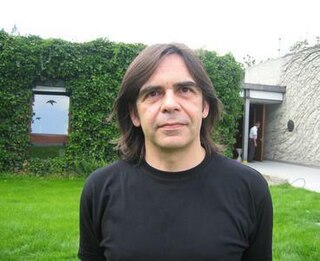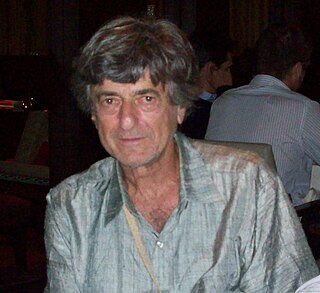
Stephen Smale is an American mathematician, known for his research in topology, dynamical systems and mathematical economics. He was awarded the Fields Medal in 1966 and spent more than three decades on the mathematics faculty of the University of California, Berkeley, where he currently is Professor Emeritus, with research interests in algorithms, numerical analysis and global analysis.

In computability theory, the theory of real computation deals with hypothetical computing machines using infinite-precision real numbers. They are given this name because they operate on the set of real numbers. Within this theory, it is possible to prove interesting statements such as "The complement of the Mandelbrot set is only partially decidable."

Lenore Carol Blum is an American computer scientist and mathematician who has made contributions to the theories of real number computation, cryptography, and pseudorandom number generation. She was a distinguished career professor of computer science at Carnegie Mellon University until 2019 and is currently a professor in residence at the University of California, Berkeley. She is also known for her efforts to increase diversity in mathematics and computer science.
In computational complexity theory, R is the class of decision problems solvable by a Turing machine, which is the set of all recursive languages.
Smale's problems are a list of eighteen unsolved problems in mathematics proposed by Steve Smale in 1998 and republished in 1999. Smale composed this list in reply to a request from Vladimir Arnold, then vice-president of the International Mathematical Union, who asked several mathematicians to propose a list of problems for the 21st century. Arnold's inspiration came from the list of Hilbert's problems that had been published at the beginning of the 20th century.
In computation theory, the Blum–Shub–Smale machine, or BSS machine, is a model of computation introduced by Lenore Blum, Michael Shub and Stephen Smale, intended to describe computations over the real numbers. Essentially, a BSS machine is a Random Access Machine with registers that can store arbitrary real numbers and that can compute rational functions over reals in a single time step. It is closely related to the Real RAM model.

Michael James David Powell was a British mathematician, who worked in the Department of Applied Mathematics and Theoretical Physics (DAMTP) at the University of Cambridge.
Toda's theorem is a result in computational complexity theory that was proven by Seinosuke Toda in his paper "PP is as Hard as the Polynomial-Time Hierarchy" and was given the 1998 Gödel Prize.
In computing, especially computational geometry, a real RAM is a mathematical model of a computer that can compute with exact real numbers instead of the binary fixed point or floating point numbers used by most actual computers. The real RAM was formulated by Michael Ian Shamos in his 1978 Ph.D. dissertation.

Endre Süli is a mathematician. He is Professor of Numerical Analysis in the Mathematical Institute, University of Oxford, Fellow and Tutor in Mathematics at Worcester College, Oxford and Adjunct Fellow of Linacre College, Oxford. He was educated at the University of Belgrade and, as a British Council Visiting Student, at the University of Reading and St Catherine's College, Oxford. His research is concerned with the mathematical analysis of numerical algorithms for nonlinear partial differential equations.
Arieh Iserles is a computational mathematician, currently Professor of the Numerical Analysis of Differential Equations at the University of Cambridge and a member of the Department of Applied Mathematics and Theoretical Physics.

Michael Ira Shub is an American mathematician who has done research into dynamical systems and the complexity of real number algorithms.
Hans Zanna Munthe-Kaas is a Norwegian mathematician at the University of Bergen, and UiT The Arctic University of Norway working in the area of computational mathematics in the borderland between pure and applied mathematics and computer science.
Peter Bürgisser is a Swiss mathematician and theoretical computer scientist who deals with algorithmic algebra and algebraic complexity theory.
Christoph Schwab is a German applied mathematician, specializing in numerical analysis of partial differential equations and boundary integral equations.
Complexity and Real Computation is a book on the computational complexity theory of real computation. It studies algorithms whose inputs and outputs are real numbers, using the Blum–Shub–Smale machine as its model of computation. For instance, this theory is capable of addressing a question posed in 1991 by Roger Penrose in The Emperor's New Mind: "is the Mandelbrot set computable?"

Juan Felipe Cucker Farkas is an Uruguayan mathematician and theoretical computer scientist who has done research into the complexity theory of the Blum–Shub–Smale computational model and the complexity of numerical algorithms in linear programming and numerical algebraic geometry.
James Milton Renegar Jr. is an American mathematician, specializing in optimization algorithms for linear programming and nonlinear programming.
Rosemary Anne Renaut is a British and American computational mathematician whose research interests include inverse problems and regularization with applications to medical imaging and seismic analysis. She is a professor in the School of Mathematical and Statistical Sciences at Arizona State University.

Anders C. Hansen is a Norwegian mathematician, who is currently a Professor of Mathematics at University of Cambridge, where he is the head of the Applied Functional and Harmonic Analysis group, and also Professor II at the University of Oslo. He works in functional analysis, harmonic analysis (applied), foundations of mathematics (computational), data science and numerical analysis.








